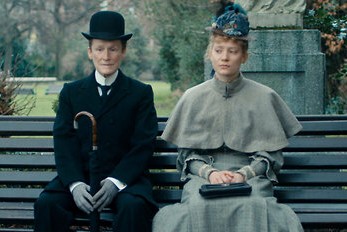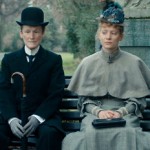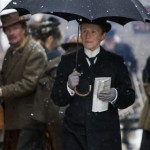When men dress up as women in the movies, it is almost always in a comedy or farce; think “Some Like It Hot,” “The Rocky Horror Picture Show,” and “Tootsie.” However, when the situation is reversed and the film concerns women dressing up as men, the movie is habitually a drama bordering on tragedy: “Yentl,” “Boys Don’t Cry,” and “Osama.” Perhaps men trying to pass themselves off as women are just funnier and more outlandish — the reasons behind the cross-dressing are usually not as urgent. In Albert Nobbs, the urgency is apparent. Albert (Glenn Close) is the head waiter at an upscale hotel in 19th century Ireland. He appears to be middle-aged and has been passing himself off as a man since he/she was 14. His livelihood and future in the midst of immense unemployment and desperate surroundings depend on maintaining this deception.
I use the pronouns “he” and “his” because nothing about Albert is female except for some well hidden physiology. Albert is extremely adept at passing as a man. When he speaks at all, his voice is low. His hair is short, he is impeccably dressed, his manners are irreproachable, and he does nothing whatsoever to call any attention to himself. As any man-servant should be, he is invisible. Working in the hospitality industry is just a means to end for Albert though. He lives such a spartan lifestyle because he hoards his money underneath his floorboard to one day soon purchase a shop and become a respected tobacconist. He is close; he has identified the vacant shop, has planned its layout, and can almost feel the escape which will come when he is his own boss.
Albert knows something is missing in his grand scheme though; he is lonely. In the beginning, he does not recognize he is missing anything important until he is forced to share his room one night with a man, Mr. Hubert Page (Janet McTeer). Through a contrived sequence, Albert is revealed as a female to Mr. Page and only later on learns Mr. Page is also a woman. Using what look like camera tricks and perspective shots, Mr. Page is a towering and bulky workman. He is also married to a woman. This bit of news tremendously confuses poor Albert. How is it possible for two women to be married to one another? It is obvious that Mr. Page and his wife are in a lesbian relationship, however, Albert would not even know what that word means. Albert comes across as asexual. There has never been a chance in his life to conceive of intimacy so all feelings and aspects of that persona just atrophied away.
Now that Albert’s eyes are opened to the fact that there are women out in the world who are married to each other, he sets his eyes on the lowly but young and desirable chambermaid Helen (Mia Wasikowska). Helen knows just how pretty she is and becomes smitten by the newly employed handyman Joe (Aaron Johnson). Not only is Albert stunted in the intimacy realm of life, but his social skills are also not as finely tuned as the younger set, who, now aware of Albert’s infatuation with Helen, may try to use those feelings for their financial gain.
While the story of Albert Nobbs is on the weaker side and not particularly engaging, the acting, specifically by Close and McTeer, is fascinating. There is a scene where Albert and Mr. Page try on some dresses and take a walk outside. For Albert, this is the first time he has worn a dress in probably 30 years. The immediate discomfort but growing acceptance and then utter joy on his face is a wonderful scene as he experiences some long repressed feelings. McTeer’s performance is equal to Close’s in every way. She/he looks 100% like a man dressed up as a woman when he puts on that dress. The makeup department for this film is spot on, much better than say, “J. Edgar” or “The Iron Lady.” Even though they did not have to age the characters as those aforementioned films did, transforming two women into men as effectively as they do is worth the price of admission alone.
Director Rodrigo Garcia, who happens to be the son of novelist Gabriel Garcia Marquez, is becoming known as the go-to filmmaker for involved and complex stories about women. He also directed “Things You Can Tell Just by Looking at Her,” “Nine Lives,” and “Mother and Child,” all recognized as thoughtful films with strong female leads. Glenn Close co-wrote the screenplay and brought with her a long experience of understanding Albert since she played him in the 1982 stage production.
I therefore recommend Albert Nobbs to enjoy the lead performances and to witness the forceful presences of Glenn Close and Janet McTeer in their convincing portrayals of the opposite sex. The story is not as compelling as one would wish for a period piece such as this, but, thankfully, that blemish is mostly overshadowed by its tour de force acting.






'Movie Review: Albert Nobbs (2011)' has no comments